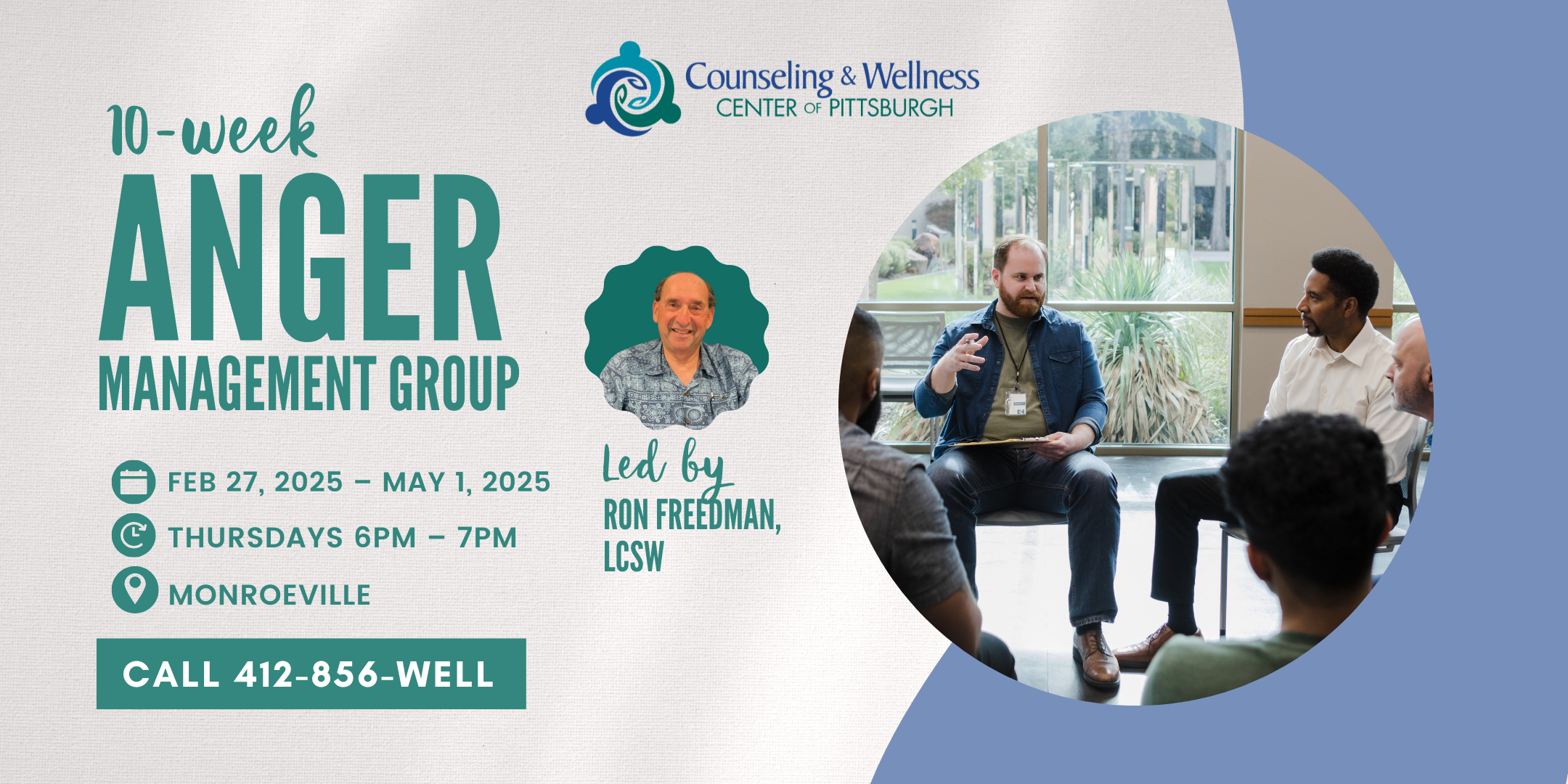
Anger Management Classes
Have anger issues caused problems in your life? By joining our Anger Management Group you will learn practical tools to better manage your emotions and reduce impulsive reactions. In the Anger Management Classes you’ll gain insights from others’ experiences and discover healthier ways to express and channel your anger, all while building accountability and fostering personal growth.
Anger Management Group Therapy
February 27, 2025 – May 1, 2025
Thursdays | 6:00 PM – 7:00 PM | Monroeville
This Anger Management group is inspired by the book Act on Life, Not on Anger, and offers a unique approach to managing anger based on Acceptance and Commitment Therapy (ACT). Grounded in compassion and mindfulness, the group also draws from Internal Family Systems and Relational Life Therapy to explore how anger impacts relationships.
The group is led by Ron Freedman, LCSW, who has been providing counseling services since 1991, with extensive experience leading anger management classes across mental health clinics, military installations, and the Department of Veterans Affairs Readjustment Counseling Service.
Some of the key topics we’ll cover include:
- Understanding the consequences of uncontrolled anger issues
- Recognizing how we mismanage anger
- Exploring passive-aggressive anger
- Unpacking the cycle of rationalizing and justifying anger
- Discovering the purpose of anger
- Learning how to face anger without letting it control us
- Using calming activities like breathwork
- Breaking free from the anger trap with acceptance and humility
- Practicing mindfulness, acceptance, and compassion
- Taking timeouts as a tool for control
- Expressing genuine remorse to heal relationships
Join us in this supportive anger management group therapy to take control, manage your anger issues, and build healthier, more balanced relationships.
Anger Management Group Structure
The structure of the Anger Management group is designed to be flexible and open. Rather than following a strict weekly schedule, we will focus on the flow of the group and the needs of the members, allowing for a more fluid approach. Here’s the general idea of how it will work:
- Participatory: Everyone will have a chance to actively engage and contribute.
- Process-Oriented: The group will focus on processing experiences and feelings, with some helpful psycho-educational content provided by the leader and group members.
- Topical & Experiential: We’ll focus on specific topics each week, but there will also be room for hands-on activities and real-life examples.
- Sharing & Learning: You’ll have the chance to share your personal experiences—what’s working for you, what isn’t, and what you’ve learned from your “wins” and “challenges.”
The goal is for each group session to feel relevant, supportive, and adaptive to what the members are going through.

Our Anger Management Group Therapy will:
- Provide you with practical tools to help you manage anger
- Reduce impulsive reactions
- Improve your relationships
- Feel less alone by being surrounded by peers also dealing with anger
In the Anger Management Classes, you’ll learn:
- How to recognize the early signs of anger
- Proven techniques to calm your body and mind.
- Healthier ways to express yourself
- How to handle challenging situations without letting anger take control
Whether you’re looking to deepen your relationships or simply understand yourself better, this Anger Management Group is a great opportunity to start making meaningful changes.

Why Sign Up For Anger Management Classes?
If you’ve ever felt overwhelmed by your anger issues, you’re not alone. In fact, A 2019 NPR-IBM Watson Health poll found that 84% of people believe Americans are angrier today compared to a generation ago and that poll was before the pandemic.
It’s important to note that anger is a natural emotional response that can range from mild frustration to intense fury, often triggered by real or imagined threats or provocations. Whether it’s a traffic jam or a stressful situation, how you interpret those triggers plays a huge role in how you react. Turned outward, anger becomes aggression that can lead to harmful outcomes like road rage, physical altercations, or even injury.
Anger can often feel overwhelming, and people simply want to get rid of it. There are two main types of strategies for anger management: one focuses on calming down (e.g., deep breathing, mindfulness, or meditation), while the other aims to release pent-up energy (e.g., punching a bag or engaging in vigorous exercise). According to a meta analytic review published in Clinical Psychology Review (Kjærvik & Bushman, 2024) calming activities are far more effective in reducing both anger and aggression than those aimed at increasing energy.
This finding can be explained by how our nervous system responds to different types of activities. Anger triggers the body’s fight-or-flight response, which elevates the stress hormone cortisol and activates the sympathetic nervous system. Calming activities like deep breathing and mindfulness help to activate the parasympathetic nervous system, which is responsible for the body’s relaxation response. These techniques counteract the body’s stress response by lowering heart rate, reducing muscle tension, and calming the mind, making them particularly effective at reducing anger.
In contrast, activities designed to release energy—like punching a bag, or running—may temporarily provide a sense of relief, but they don’t necessarily resolve the underlying emotional state. In fact, they can even keep the sympathetic nervous system engaged, prolonging feelings of tension and frustration. Instead of diminishing the emotional intensity of anger, they may reinforce it by focusing attention on the feeling itself.
Thus, the most effective approach for managing anger involves strategies that focus on lowering arousal and stress, creating a more peaceful internal state, rather than methods that might simply express or amplify the emotion.

Meet Your Facilitator for Anger Management Group Therapy
Anger Management Group FAQs
Q: Where will the Anger Management Classes be held?
A. The Anger Management Classes will be held in person at our Monroeville location.
Q: What Day and Time is the Anger Management Therapy Group?
A. The Anger Management Therapy Group will occur on Thursdays from 6:00 PM – 7:00PM.
Q: What dates does the Anger Management Therapy Group run?
A. The Anger Management Therapy Group will begin on Thursday, February 27 and conclude on Thursday, May 1.
Q: How many weeks does the Anger Management Therapy Group run?
A. The Anger Management Therapy Group runs for 10 weeks.
Q: Who is facilitating the Anger Management Group?
A. The Anger Management Group is led by Ron Freedman, LCSW, who has been providing counseling services since 1991. Ron has extensive experience leading anger management groups across mental health clinics, military installations, and the Department of Veterans Affairs Readjustment Counseling Service.
Q: Do you accept insurance for the Anger Management Group?
A. Yes, we accept Highmark BCBS, UPMC, United, Aetna, and Cigna.
Q: What is the self-pay fee for the Anger Management Group?
A. The self-pay fee is $50 per class.
Q: Can anyone join the Anger Management Group?
A. The Anger Management Group is open to men, women, and non-binary individuals. However, please note that those who are court-ordered to attend anger management are not eligible to join.
Q: Do I need to purchase the book ACT on Life Not on Anger?
Q: Do I have to be a current Counseling and Wellness Center of Pittsburgh client to join?
A. No, you do not need to be a client with us. However, to ensure the group is a good fit for you, an intake with Ron Freedman will be required. This will help us tailor the experience to best meet your needs.
Q: Do I have to attend all sessions or can I drop in?
A. You do not need to attend all sessions and can drop in after the group starts. PLEASE NOTE: You must get registered and have an intake with Ron Freedman, LCSW.
If you are interested in attending after the group begins on Thursday, February 6, call 412-322-2129 ext. 3.
Q: How do I sign up for the Anger Management Group?
A. Please email info@counselingwellnesspgh.com or call 412-322-2129 ext. 3 if you are interested in joining the Anger Management Group. You can also fill out the form at the bottom of this page.
To ensure the group is a great fit for you, an intake with Ron Freedman will be required. This will help us tailor the experience to best meet your needs.
Ready to Join Anger Management Group Therapy?
Please fill out the form below if you have any questions about our Anger Management Classes or are ready to get started! Our team is here to provide you with the information and support you need.
Blog Posts About Anger Issues

Why Is It Female Rage, Not Simply Anger in Women?
by Counseling and Wellness Center of PittsburghJanuary 28, 2025 anger, anger in women, anger issues, anger management, angry woman, angry women, female rage, feminine rage, gender roles, gender stereotypes, rage, women's mental health0 comments
Why Is It Female Rage, Not Simply Anger in Women?
Anger is a universal emotion, yet for women, it’s often misinterpreted, stigmatized, and renamed. It’s rarely seen as just “anger.” Instead, society frames it as “female rage” or the dramatized “angry woman.” Even in our online search behaviors, this pattern emerges: while “anger in women” averages only 20 monthly...
Learn More
No Contact vs. The Silent Treatment
by Counseling and Wellness Center of PittsburghDecember 4, 2024 abuse, adult children of emotionally immature parents, emotional abuse, emotionally immature parents, family estrangement, how to deal with a narcissist, narcissist, Narcissistic mother, Narcissistic parents, narcissistic personality disorder, no contact, no contact rule, silent treatment, toxic family, toxic parents, toxic relationships, trauma bond, Unhealthy relationships0 comments
No Contact vs. The Silent Treatment
In relationships, communication is key. Two common strategies used to withdraw emotionally are the No Contact rule and the Silent Treatment. While they may appear similar, these two approaches differ significantly in their intent, duration, and emotional impact. Understanding the distinction between these strategies is essential...
Learn More
Emotional Invalidation, cPTSD, and Its Lasting Impact
by Counseling and Wellness Center of PittsburghAugust 21, 2024 ACEs, adult children of emotionally immature parents, Adverse Childhood Experiences, childhood trauma, complex post traumatic stress disorder, complex trauma, cptsd, effects of emotional invalidation, emotional invalidation, emotional invalidation examples, invalidating, validation0 comments
Emotional Invalidation, cPTSD, and Its Lasting Impact
Emotional validation is crucial for healthy human development, especially within the parent-child relationship. When parents fail to validate their children’s emotions, dismissing or minimizing their feelings, it can lead to profound and long-lasting consequences.
In this blog post, we’ll explore...
Learn More
Adult Children of Emotionally Immature Parents
by Counseling and Wellness Center of PittsburghDecember 7, 2023 abuse, adult children of emotionally immature parents, borderline personality disorder, boundaries, BPD, BPD Relationships, complex trauma, counseling for trauma, cptsd, dysfunctional family, emotionally immature parents, family counseling, family estrangement, generational trauma, invalidation, Narcissistic mother, Narcissistic parents, narcissistic personality disorder, Personality disorders, pittsburgh, resilience to trauma, therapy for trauma, toxic family, toxic parents, trauma, trauma counseling, trauma informed care, trauma therapy, traumatic childhood, victim blaming1 comment
Adult Children of Emotionally Immature Parents
Being a parent is a big responsibility. And sometimes, parents find it difficult to work through their emotions. A parent’s inability to be emotionally mature, often referred to as emotionally immature parents, can make things complicated for their kids and the entire family as a whole.
The...
Learn More
Is Anger Genetic? Unraveling the Nature vs. Nurture Debate
by Counseling and Wellness Center of PittsburghAugust 7, 2023 anger, anger counseling, anger issues, anger management, anger management counseling0 comments
Am I made to be angry? One of my parents was so angry all of the time, I don’t want to be like that. I’ve heard anger is genetic, doesn’t that mean I will be like that too? Will my kids be angry if I am angry? People who struggle to control their anger frequently ask, ‘Is anger genetic?’ The answer is, it’s complicated. Both genetics and learned behavior play a role in...
Learn More
Understanding and Overcoming Anger Issues: Tips and Strategies
by Counseling and Wellness Center of PittsburghJuly 23, 2023 anger, anger counseling, anger issues, anger management, anger management counseling, overcoming anger0 comments
Have you ever felt so overwhelmed by anger that you cannot seem to shake it off? Overcoming anger is a universal emotional journey that everyone encounters. However, for some individuals, managing this intense emotion becomes a challenging task. At times, uncontrolled anger can lead to destructive and impulsive behaviors, causing personal and relational turmoil in your life....
Learn More
Adverse Childhood Experiences ACEs: Understanding the Impact of Childhood Trauma and Building Resilience
by Counseling and Wellness Center of PittsburghJune 5, 2023 ACEs, Adverse Childhood Experiences, child counseling, children mental health0 comments
Childhood is a time of innocence, wonder, and growth. However, for some individuals, this period may be marred by adverse childhood experiences (ACEs) that can have a lasting impact on their lives. In this blog post, we will explore the world of ACEs, delve into their effects, discuss the importance of addressing and mitigating the consequences of childhood trauma, and explore...
Learn More
How to Help a Teenager With Anxiety
by Counseling and Wellness Center of PittsburghAugust 31, 2022 anger, anxiety, anxiety therapy pittsburgh, help for anxiety, mental health, social anxiety, teen anxiety, therapy for anxiety, treatment for anxiety, treatment for anxiety disorder0 comments
Teenagers often have worries and intrusive thoughts that can lead to ongoing anxiety. One of the most common types is Generalized Anxiety. The DSM-V explains Generalized Anxiety Disorder as, “excessive anxiety and worry occurring more days than not for at least 6 months, about a number of events or activities such as work or school performance.” Anxiety can have physical and...
Learn More
Don’t Wait to Get Help for Anger Management: Here’s Why
by Counseling and Wellness Center of PittsburghFebruary 28, 2021 anger, anger management, anger management counseling0 comments
Do you remember the last time you felt angry? Perhaps you were peeved that your kid left a sliver of milk in the jug and didn’t add it to the grocery list. Maybe a truck cut you off at the freeway entrance, and you muttered obscenities. Or maybe it’s hard to look back at the last time, because you punched a hole in the wall.
We All Get Angry
Though sometimes unpleasant, anger comprises a...
Learn More
14 ways to tell if a relationship is toxic.
by Counseling and Wellness Center of PittsburghMarch 28, 2019 abuse, anger, borderline personality disorder, BPD, BPD Relationships, domestic violence, jealousy, narcissistic personality disorder, Personality disorders, relationship conflict, signs of a toxic relationship, toxic relationship signs, Unhealthy relationships0 comments
14 Toxic Relationship Signs
According the great writer Leo Tolstoy “All happy families are alike; each unhappy family is unhappy in its own way.” Our sources say, ‘Not true Tolstoy’, of course when psychologists and social scientists put their noses in the matter we can quantify and define the exact toxic relationship signs to look out for.
A healthy marriage, friendship, or...
Learn More
Anger: 4 Ways To Tell That You or Loved One Has a Problem
by Counseling and Wellness Center of PittsburghApril 26, 2018 anger, anger counseling, anger management0 comments
Anger is a primary emotion that all humans and even animals exhibit in some forms, anger is an activating response and it can often even signal to us some valuable information if we are open to hearing it. When we are practicing mindfulness and have developed our capacity to respond well to infuriating situations, we can become aware of our feelings, then respond in a way that keeps our goals...
Learn More

